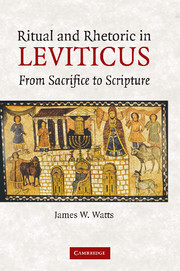Book contents
- Frontmatter
- Contents
- Abbreviations
- Preface
- Ritual and rhetoric in Leviticus
- 1 Introduction: Ritual Text and Ritual Interpretation
- 2 The Rhetoric of Ritual Instruction
- 3 The Rhetoric of Burnt Offerings
- 4 The Rhetoric of Sin, Guilt, and Ritual Offerings
- 5 The Rhetoric of Ritual Narrative
- 6 The Rhetoric of Atonement
- 7 The Rhetoric of Priesthood
- 8 The Rhetoric of Sacrifice
- 9 The Rhetoric of Scripture
- Bibliography
- Index of Biblical Citations
- Index of Other Ancient Literature
- Index of Authors
- Index of Subjects
Preface
Published online by Cambridge University Press: 22 July 2009
- Frontmatter
- Contents
- Abbreviations
- Preface
- Ritual and rhetoric in Leviticus
- 1 Introduction: Ritual Text and Ritual Interpretation
- 2 The Rhetoric of Ritual Instruction
- 3 The Rhetoric of Burnt Offerings
- 4 The Rhetoric of Sin, Guilt, and Ritual Offerings
- 5 The Rhetoric of Ritual Narrative
- 6 The Rhetoric of Atonement
- 7 The Rhetoric of Priesthood
- 8 The Rhetoric of Sacrifice
- 9 The Rhetoric of Scripture
- Bibliography
- Index of Biblical Citations
- Index of Other Ancient Literature
- Index of Authors
- Index of Subjects
Summary
This book has its origins in three strands of research that have become more intertwined the longer I have pursued them. The first is rhetorical analysis of biblical and other ancient texts. I became interested in rhetoric when I noticed that the Hebrew Bible instructs its readers in how to use the Torah (Pentateuch) by memorizing it and reading it aloud (Deuteronomy 4: 6–9, 31: 9–13) and then models this usage in stories about prominent characters (Moses in Exodus 24, Joshua in Joshua 8, King Josiah in 2 Kings 22–23, and Ezra in Nehemiah 8), reading it aloud to the assembled people of Israel and Judah. The fact that the text presents itself as suited for public reading suggested to me that it may have been intentionally shaped with rhetorical considerations in mind. Exploring the consequences of this insight for the structure and contents of the Pentateuch led to my book Reading Law: The Rhetorical Shaping of the Pentateuch (1999). That book did not, however, present detailed rhetorical analyses of specific pentateuchal texts. This book begins to make up for that lack by subjecting the early chapters of Leviticus to close scrutiny from a rhetorical perspective (Chapters 2 through 6). Using Aristotle's definition of rhetoric as the art of persuasion, these studies ask the question “Who was trying to persuade whom of what by writing these texts?”
- Type
- Chapter
- Information
- Ritual and Rhetoric in LeviticusFrom Sacrifice to Scripture, pp. xv - xviiiPublisher: Cambridge University PressPrint publication year: 2007

